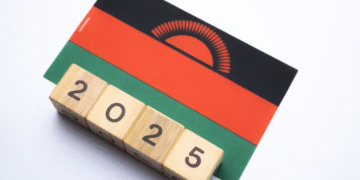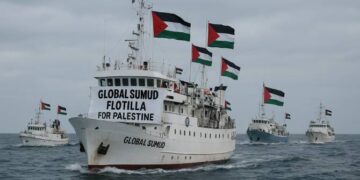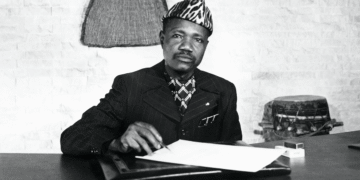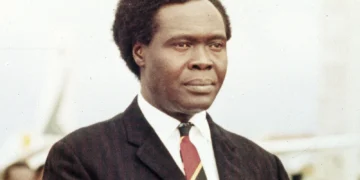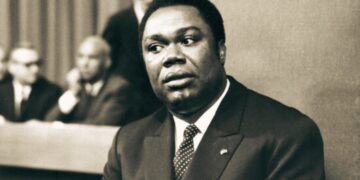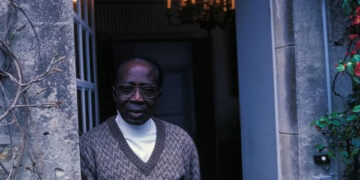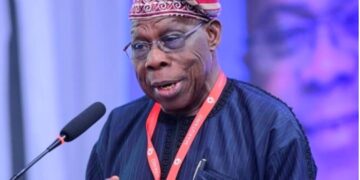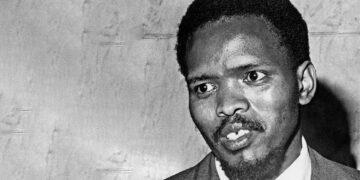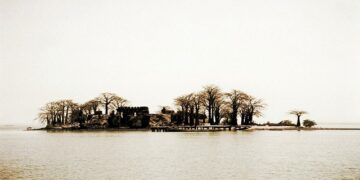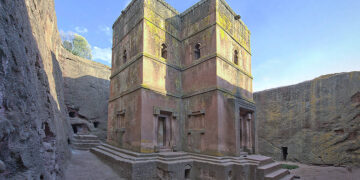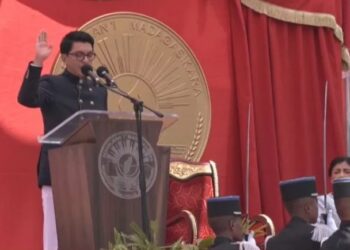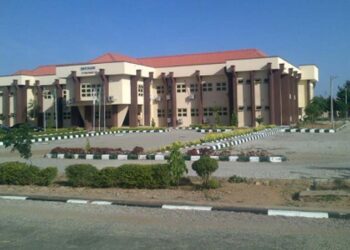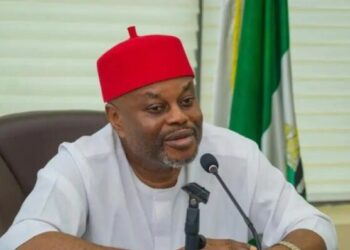Cyprian Odiatu Duaka Ekwensi, a pioneering Nigerian novelist, is considered one of the founding fathers of modern Nigerian literature in English. He is best known for his vivid and vibrant depictions of Nigeria’s bustling cities, exploring the challenges, opportunities, and struggles faced by individuals amidst rapid social transformations.
Ekwensi’s works, characterised by a simple and straightforward style, reflect the realities of post-colonial African urban life and contribute to the construction of a distinct Nigerian literary identity.
Cyprian Ekwensi was born on September 26, 1921, in Minna, Niger State, Nigeria, to Igbo parents. A native of Nkwelle Ezunaka, Oyi Local Government Area, Anambra State, in southern Nigeria, his father was a storyteller and elephant hunter.
Ekwensi was educated at renowned Nigerian institutions such as Government College in Ibadan, Achimota College in Ghana, and the School of Forestry, Ibadan. After graduating, Ekwensi held various jobs before devoting himself to writing. He worked as a teacher, then as a forestry officer, and later as a journalist and broadcaster for the Nigerian Broadcasting Corporation (NBC). His work in radio helped him understand the rhythms of daily life and the language of the streets, which enriched his literary style.
Ekwensi’s literary career began in the 1940s and 1950s, a period that witnessed a literary revival in Nigeria with the emergence of local publishing houses. He began by writing short stories and radio plays before turning to novels. His early works targeted a wider audience, including young people and new readers, making them accessible and popular.
Among Ekwensi’s most notable works that established his status as a novelist is “People of the City” (1954). This novel is considered a landmark in African literature, as it is the first West African novel in modern style to be published in the English language and directly depicts urban life. Set in the bustling city of Lagos, it tells the story of Amusa Sango, an ambitious young journalist and jazz musician, who faces the challenges of poverty, corruption, crime, and complex relationships in the big city. The novel depicts the struggle between tradition and modernity, highlighting the allure and dangers of the city.
In 1961, Ekwensi published “Jagua Nana,” which is considered one of his most famous works and tells the story of Jagua Nana, a beautiful young woman searching for her place in Lagos. The novel explores themes of sex, betrayal, ambition, and the role of women in changing Nigerian society. The novel generated some controversy for its bold themes at the time, but it was a huge success and contributed to the debate on morals and values in African society.
“Burning Grass” was published in 1962. In contrast to his urban novels, this novel explores the lives of Fulani herders in the northern regions of Nigeria, offering a portrait of rural life and its challenges. While “Iska” (1966), also set in Lagos, follows the story of a young woman seeking independence in a man’s world.
Ekwensi’s Style and Themes:
- Depictions of Urban Life: Ekwensi is known for his unique ability to capture the essence of life in Nigerian cities. He describes the crowded streets, bustling markets, late-night bars, overcrowded apartments, and constant noise, immersing the reader in the urban experience. These themes were relatively new in African literature at the time, as most writers focused on rural or historical issues.
- Complex Characters: Ekwensi presents multifaceted characters, often ambitious, but also vulnerable and vulnerable to temptation. He depicts their internal struggle between traditional values and the allure of modern life and how they are affected by corruption, crime, and poverty.
- Direct and Realistic Style: Ekwensi’s style is characterised by simplicity and clarity, making it accessible to a wide audience. He does not rely on complex or experimental language but rather focuses on straightforward narratives that reflect the realities of everyday life. This approach has sometimes drawn criticism from some critics who see it as lacking literary depth, but it has been highly effective in reaching ordinary readers.
Ekwensi’s works address many of the social and economic concerns facing post-independence Nigeria, such as:
- Corruption: Corruption was a recurring theme in his works, showing how it permeates all levels of society and impacts the lives of individuals.
- Crime: Ekwensi portrayed crime in its various forms, from fraud to violence, as an integral part of the urban fabric.
- Cultural Transformations: He explored the conflict between traditional and modern values and how individuals struggle to adapt to rapid social changes.
- The Role of Women: Ekwensi presented strong, independent female characters who challenged social norms and pursued their ambitions in a male-dominated world.
Some Quotes from Cyprian Ekwensi
People of the City (1954):
“His motto had become money, money, money. This was the way people of the city realized themselves.”
“We want a new life, new opportunities … We want to live there for some time — but only for some time ! We have our homeland here and must come back when we can answer your father’s challenge ! When we have done something, become something!”
“But now things are different. Yes, things are gradually passing into African hands. Soon al the power will be in our hands. It’s worth fighting for.”
Burning Grass (1962):
“Not a war. But then, it was a war. When the forest burns do the locusts stop to say goodbye?”
“I say there has been a war. If a fish comes out of the water and says the crocodile has one eye, who has been there with him?”
“Night might convert the old devil into a fiend.”
“A maiden is one of those things a man must not trust. By Allah, it is!”
“He who waits will see what is in the grass.”
“You pay twenty head of cattle for a maiden because you are excited. Then when your head is cool, you begin to say “If I had known!”
“On the day of death, there is no medicine.”
In addition to his novels, Ekwensi has written numerous short stories and children’s books, demonstrating his interest in promoting reading and culture among younger generations. He also held key administrative positions in the government media sector, including Director of the Information Division of the Federal Ministry of Information and Director-General of the Nigerian Publications Corporation.
Cyprian Ekwensi died on November 4, 2007, leaving behind a rich literary legacy. Although some critics have criticised his works for what they perceived as a “lack of literary complexity” or an “excessive emphasis on plot,” his influence on Nigerian literature is undeniable. Ekwensi was an authentic voice of urban African life and helped lay the foundations for the modern African novel. His works are still read and studied today, offering valuable insights into the challenges and opportunities Nigeria faced during its period of great post-independence transformation and reminding us of the importance of literature as a mirror of society.














